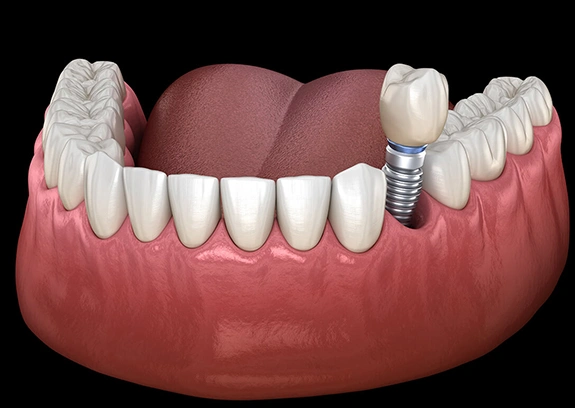
Smile with confidence using dental implants
Consider all the advantages
If you have missing teeth—whether one, several, or all—dental implants can help you restore a complete and beautiful smile! The popularity of dental implants is growing rapidly, with around 3 million people having already received them and an additional 500,000 joining their ranks each year. This surge in popularity is due to the numerous benefits dental implants offer over other replacement options.
While traditional fixed bridges and dentures are effective for replacing missing teeth, dental implants provide several distinct advantages:
- Dental implants closely mimic the appearance, sensation, and function of natural teeth.
- With proper placement, oral hygiene, and regular care, dental implants can last many years.
- Implants stimulate the underlying bone, preventing bone loss and preserving your natural facial contours.
- Unlike removable dentures, implants function like natural teeth, remaining securely in place while speaking or eating.
- Implants allow you to speak, eat, and enjoy all types of food without restrictions.
- Dental implants do not decay and are not prone to cavities.
- Unlike fixed bridges, implants do not require any preparation or crowning of adjacent teeth.
Types of Dental Implants
Single-tooth implant
A traditional fixed bridge typically involves preparing and crowning the teeth on both sides of the gap. These crowned teeth support the artificial teeth, or "pontics," that fill the space. Much like a bridge over water relies on strong pillars at each end, a traditional fixed bridge gains strength and stability from the crowned teeth supporting one or more pontics.
In contrast, a cantilever fixed bridge is similar but differs significantly. Only one side of the pontic is supported by a crown, while the other side extends into the gap without additional support.
Implant-supported fixed bridges
Full arch replacement with four or six implants
Implant-retained denture
Are Dental Implants the Right Choice for me?
How Are Dental Implants Placed?
Careful planning and execution are essential for successful dental implant procedures, including the initial treatment planning, precise placement of the implants, and the creation and insertion of final crowns, bridges, or dentures.
Dental implant surgery is generally a minor outpatient procedure, though its complexity depends on the number of implants and any additional preparations required for the supporting bone.
Effective communication is key to our patient care approach. Before your implant procedure, we will discuss anesthesia and sedation options, and provide detailed instructions for pre- and post-operative care. We ensure you are well-informed throughout the entire process.
After an implant is placed, it typically takes a few months to fully integrate with the surrounding bone. Some implant solutions may allow for the placement of a temporary crown or bridge on the same day, while others require waiting for complete healing and fusion with the bone before the permanent prostheses are placed.
